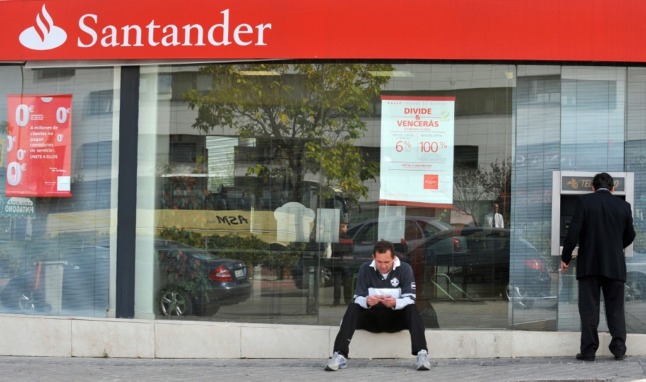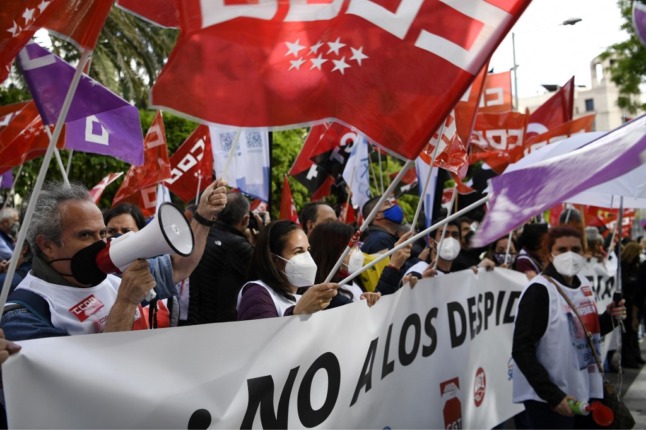So here’s The Local’s guide to help foreigners in Spain avoid provoking sidewards glances and awkward silences.
Shaking hands

Photo: Karelnoppe/Depositphotos
Spanish people always kiss each other on the cheeks to greet each other. It is always two kisses and it takes place when you are introduced to someone even if it is the first time you meet them. If the greeting is between two men it’s a thump on the back, or a wave of the hand. Any other form of greeting in Spain will be met with befuddlement. Attempt just one kiss and you will leave the Spaniards kissing in mid-air and if you stick out your arm for a handshake then expect it to be pulled in and met with the double kiss.
Wearing the wrong sort of clothing out of season

Photo: Dusanpetkovic1/Depositphotos
There are strict unwritten rules determining what to wear in Spain. The winter wardrobe is not packed away until the clocks go back at the end of March regardless of an early Spring warm spell. Short trousers are rarely seen as appropriate unless in the height of summer or at the beach and women of a certain age can be spotted sporting their fur coats in cities in central and northern Spain until at least Easter.
Eating food inappropriately (either early, at your desk, or on the move)

Photo: Daxiao_productions/Depositphotos
Attempting to eat your evening meal anytime before 9pm is considered just plain weird in Spain, likewise don’t attempt to sit down for lunch before 2pm. And don’t even think about rushing your meal. Meals are social occasions to savour and enjoy.
So no eating sandwiches at your desk and prepare for some very strange looks if you unwrap a bocadillo while on the bus or the metro, or, heaven forbid, while you are actually strolling down the street.
Walking around barefoot

Photo: Seb_ra/Depositphotos
You will never see Spanish people walking barefoot. Not at the beach, not walking on the grass in the park, having kicked off their shoes on their lunch break, not even in their own homes. Children, even tiny babies, always wear shoes. Flip flops will be flung off at the shore line. Attempting to bare your soles will likely provoke a stern telling off and a lesson on health and safety.
Tipping

Spanish people do tip, but not always and never very much. It may be standard in Anglophone countries to add ten percent to your bill when served at a table but Spaniards as a whole are happy to leave a few coins, and only if they consider the service to be exemplary.
Drinking too much

Photo: gstockstudio/Depositphotos
Although Spain is full of bars and drinking alcohol is very much part of everyday culture, there isn’t the same culture of binge drinking that exists in northern European countries such as Britain. Ordering a pint instead of the more usual ‘caña’ raises eyebrows in the expectation that the drinker is on a ‘bender’. Tapas is considered an accompaniment to drinking and not a replacement for dinner.
Being too polite
The occasional ‘por favor’ will be forgiven, but Spaniards don’t quite know how to react to those (usually British) visitors who insist on apologizing willy-nilly for everything from accidentally bumping elbows to arriving five minutes late.
Being on time

Which brings us to the next point. It may be considered rude in some countries to keep someone waiting but Spaniards will be utterly perplexed if you apologize for anything less than a 20 minute delay to a social meetup. And they certainly won’t understand why you are annoyed when they casually stroll up 20 minutes late.
Not paying for everyone’s drinks on your birthday

Photo: Pressmaster/Depositphotos
This can be very awkward indeed. Remember that in Spain, the birthday boy (or girl) invites everyone else to a drink. Forget to pick up the bill at the end of the celebration and they will think they have offended you.
Asking “aren’t you too old to be living with your mum and dad?”
Expressing surprise when someone in their 30s (or even 40s) tell you they still live with their mother is a very sure way of creating an awkward situation. Close family ties, mama’s cooking and a tradition of attending the local university instead of moving away mean that many Spaniards remain ‘in the nest’ much longer than their counterparts elsewhere. Add to that years of economic recession and the EU’s second highest unemployment rate which has left a generation struggling to pay a mortgage and it’s hardly surprising they haven’t cut the apron strings.
“Which side of the Spanish Civil War did your family fight on?”

Archive photo: AFP
Spain’s bloody Civil War (1936-1939) between the nationalists of Francisco Franco and the left-wing republicans remains a very sensitive issue in Spain.
After Franco died in 1975, Spain tried to close the book on a dark time with a ‘pact of forgetting’ and a 1977 Amnesty Law which blocked legal punishment of any Franco-era crime. People are still reluctant to pick at these not-so-old wounds. Take this topic on at your own risk.
Mentioning siestas

Photo: Justyna Rawińska / Flickr
Bringing up the stereotype of lazy siesta-sleeping Spaniards won’t go down well. In fact, statistics tell a different story though: according to the OECD, people in Spain actually spend more hours at work a year than the Germans (1,665 versus 1,388). There are moves to shorten the standard working day in Spain in the belief that it woud be more productive if people spent less time on the job.
Talking about Gibraltar

Photo: AFP
One last piece of advice. If you want to avoid potential pitfalls then don’t mention Gibraltar. And certainly don’t compare the British outcrop at the southwestern foot of Spain to Melilla or Ceuta, Spain’s enclaves in North Africa. Most Spaniards don’t really give a hoot about sovereignty over The Rock but it can provoke a tense stand off and shouts of “Gibraltar Español”.





 Please whitelist us to continue reading.
Please whitelist us to continue reading.
Member comments